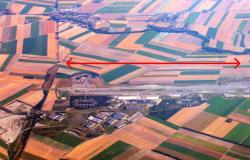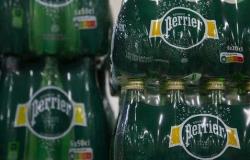Health risks –
Nestlé Waters must consider stopping its production of Perrier
The French regional health agency believes that Nestlé must stop its production of sparkling water in the south of France, because of the sanitary quality of the catchments.
Published today at 10:49 a.m.
After an inspection carried out at the end of May on the only Perrier packaging site in Gard, the regional health agency considers that Nestlé Waters must stop its production.
Roy Rochlin/GETTY IMAGES NORTH AMERICA/Getty Images via AFP
Subscribe now and enjoy the audio playback feature.
BotTalk
Nestlé Waters must consider ending production of natural mineral water Perrier, in the south of France, due to health risks, according to a confidential report unveiled Monday by the French newspaper “The World” and “Radio France”.
“The most famous brand of sparkling water is under threat of losing its natural mineral water label which has made its reputation for more than a century,” writes the French daily Le Monde, according to which “a confidential report from the “the regional health agency (ARS) of Occitanie leaves little room for another outcome.” “The blow could be fatal for Perrier,” says the media.
After an inspection carried out at the end of May on the only Perrier packaging site in Gard, the state agency considers that Nestlé Waters, owner of the brand, must seriously consider “a cessation of the production of mineral water on the site of Vergèze” due to the regularly degraded health quality of its catchments and, in particular, a virological risk.
The ARS thus “invites” the subsidiary of the Vevey giant to “strategically examine another possible food use of the exploitation of current mineral water catchments”, on condition of providing “additional health safety guarantees” . Asked by Le Monde and Radio France, Nestlé Waters indicates that it “cannot make comments”, having “no knowledge of the final report”.
Waiting for the green light from the prefect
The future of the brand and its production site in Vergèze, which employs a thousand employees, is now subject to arbitration by the Gard prefecture, which must rule on the request for renewal of the operating authorization from the “Perrier source” filed in October 2023 by Nestlé. Contacted, the prefecture indicates that the decision could be made during the “first half of 2025” after receipt of “the opinion of hydrogeologists approved in matters of public hygiene”, complementary to the ARS report.
In April, the prefect of Gard already suspended the operation of one of the seven catchments after an episode of contamination by bacteria of fecal origin. Nestlé then announced that it had destroyed some 3 million bottles “as a precaution”. “Presented then by Nestlé and the prefecture as a one-off event linked to intense rains, this situation is in reality the consequence of a general deterioration in the quality of the underground water tables exploited by Nestlé in Vergèze,” writes Le Monde.
Last January, the two media revealed that Nestlé Waters had used prohibited treatments for several years – microfiltration, UV filters and activated carbon – to deal with these bacterial or chemical contaminations on some of its wells in Vergèze. but also on its site in the Vosges, where the waters of Hépar, Contrex and Vittel are drawn. The State had known about some of these practices since at least 2020. Nestlé admitted to using prohibited treatments, also for Henniez in Switzerland. In order to shed light on this issue, the Senate launched a commission of inquiry into “the practices of bottled water manufacturers and the responsibilities of public authorities in the failures to control their activities”.
According to the ARS inspection report, the risk of fraud continues: “nothing prevents the treatment of natural mineral water by unauthorized processes used for other types of water.” Its inspection mission evokes a “virological risk” (adenovirus, norovirus, hepatitis A) for consumers. “The microfilters have no retention effect on viruses,” note the inspectors, who specify that “the operator has never demonstrated the presence of these viruses in the water.”
“Latest news”
Want to stay on top of the news? “Tribune de Genève” offers you two meetings per day, directly in your email box. So you don’t miss anything that’s happening in your canton, in Switzerland or around the world.
Other newsletters
Log in
ATS
Did you find an error? Please report it to us.
0 comments






